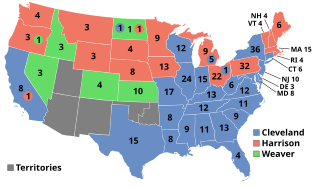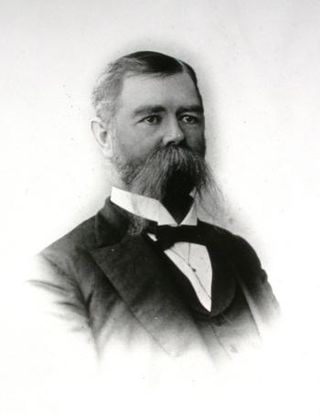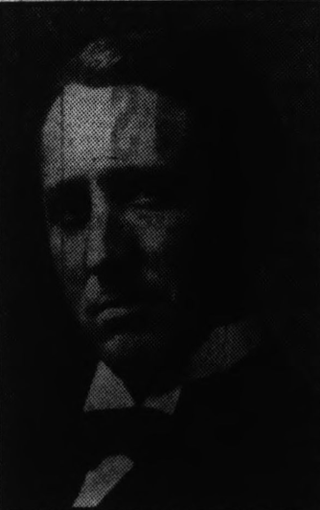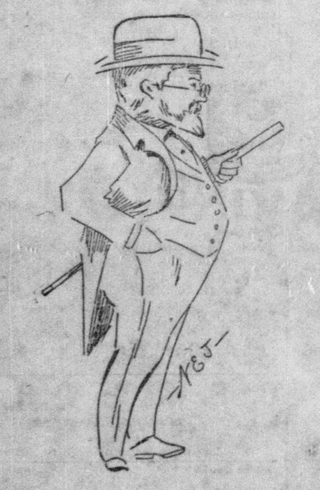
The 1892 United States presidential election was the 27th quadrennial presidential election, held on Tuesday, November 8, 1892. In the fourth rematch in American history, the Democratic nominee, former president Grover Cleveland, defeated the Republican incumbent, President Benjamin Harrison. Cleveland's victory made him the first and, to date, the only person in American history to be elected to a non-consecutive second presidential term. It was also the first of two occasions that incumbents were defeated in consecutive elections—the second being Gerald Ford's loss to Jimmy Carter in 1976, followed by Carter's loss to Ronald Reagan in 1980.

Elias Carr was an American planter, lawyer, and politician who served as the 48th governor of the U.S. state of North Carolina from 1893 to 1897.
Southern Democrats are members of the U.S. Democratic Party who reside in the Southern United States.

The 1978 United States Senate elections were held on November 7, in the middle of Democratic President Jimmy Carter's term. The 33 seats of Class 2 were contested in regular elections. Special elections were also held to fill vacancies.

The 1954 United States Senate elections was a midterm election in the first term of Dwight D. Eisenhower's presidency. The 32 Senate seats of Class 2 were contested in regular elections, and six special elections were held to fill vacancies. Eisenhower's Republican party lost a net of two seats to the Democratic opposition. This small change was just enough to give Democrats control of the chamber with the support of an Independent who agreed to caucus with them; he later officially joined the party in April 1955.

David Moffatt Furches was an American politician and jurist who served as an associate justice (1895–1901) and chief justice (1901–1903) of the North Carolina Supreme Court.

United States gubernatorial elections were held on November 3, 2020, in 11 states and two territories. The previous gubernatorial elections for this group of states took place in 2016, except in New Hampshire and Vermont where governors only serve two-year terms. These two states elected their current governors in 2018. Nine state governors ran for reelection and all nine won, while Democrat Steve Bullock of Montana could not run again due to term limits and Republican Gary Herbert of Utah decided to retire at the end of his term.

The 1912 Colorado gubernatorial election took place on November 8, 1912. Democratic state Senator Elias M. Ammons defeated the Progressive, Republican and Socialist candidates future Senator Edward P. Costigan, Clifford C. Parks and Charles A. Ashelstrom with 42.91% of the vote.

The 2020 North Carolina lieutenant gubernatorial election took place on November 3, 2020, to elect the Lieutenant Governor of North Carolina, concurrently with the 2020 U.S. presidential election, as well as elections to the United States Senate and elections to the United States House of Representatives and various state and local elections. Primary elections were held on March 3, 2020.

Herbert Floyd Seawell was a North Carolina lawyer and politician who served as the United States Attorney for the Eastern District of North Carolina from 1910 to 1914, and judge of the United States Board of Tax Appeals from 1929 to 1936.

There were three special elections to the United States House of Representatives in 2019 during the 116th United States Congress.

The 1916 North Carolina gubernatorial election was held on November 7, 1916. Democratic nominee Thomas Walter Bickett defeated Republican nominee Frank A. Linney with 58.15% of the vote. At the time, Bickett was the state's Attorney General, while Linney was an attorney and chairman of the North Carolina Republican Party.

The 1900 North Carolina gubernatorial election was held on August 2, 1900. Democratic nominee Charles Brantley Aycock defeated Republican nominee Spencer B. Adams with 59.57% of the vote. The election started a string of 18 consecutive elections in which the Democratic nominee won the Governor's office. The state would not elect another Republican as governor until James E. Holshouser, Jr. won in 1972.

The 1896 North Carolina gubernatorial election was held on November 3, 1896. Republican nominee Daniel Lindsay Russell defeated Democratic nominee Cyrus B. Watson with 46.52% of the vote. This was the only election in North Carolina between 1872 and 1972 in which the Republican nominee won the governor's office, and the only one until 2016 in which no candidate received over 50% of the vote.

The 1876 North Carolina gubernatorial election was held on November 7, 1876. Democratic nominee Zebulon Baird Vance defeated Republican nominee Thomas Settle with 52.83% of the vote.

The 2026 United States Senate elections are scheduled to be held on November 3, 2026, with 33 of the 100 seats in the Senate being contested in regular elections, the winners of which will serve 6-year terms in the United States Congress from January 3, 2027, to January 3, 2033. Senators are divided into 3 groups, or classes, whose terms are staggered so that a different class is elected every 2 years. Class 2 senators were last elected in 2020, and will be up for election in 2032.

The 1946 Texas gubernatorial election was held on November 5, 1946.

The 1892 Idaho gubernatorial election was held on November 8, 1892.
From 1894 to 1900 the North Carolina Republican Party and the Populist Party collaborated via electoral fusion to compete against the North Carolina Democratic Party. This political coalition was dubbed Fusionism.

Wyatt Patrick Exum was an American farmer, physician and politician. Born in Wayne County, North Carolina, he studied medicine at Trinity College and served in the Confederate States Army during the American Civil War. Left impoverished by the war, he resumed his medical practice and eventually made enough money to establish a farm in Wayne County. Exum joined the Populist Party and was nominated as its candidate in the 1892 North Carolina gubernatorial election after the first candidate withdrew. Politically unknown in much of the state, Exum was a poor public speaker and his campaign was marked by several scandals publicized by the Democratic press, including an incident where he attacked Charles B. Aycock with a knife. He placed third in the election, winning a majority of the votes in only three counties. His health declined as he aged and he died in 1911.

















